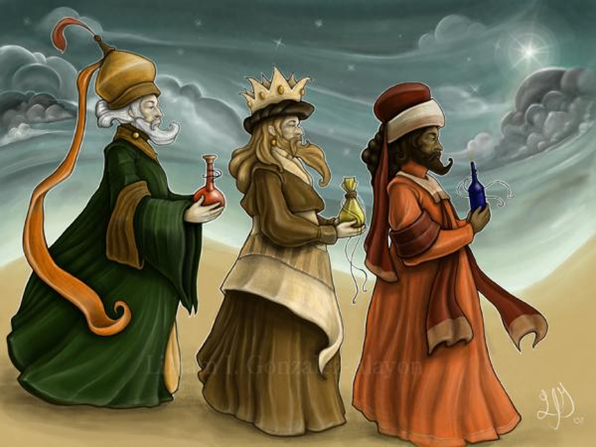Unraveling the Mystery of the Magi Who Visited Jesus

Who were these mysterious figures who traversed vast distances, guided by a celestial beacon, to pay homage to a newborn king? The story of the Magi, often referred to as the wise men or the three kings, has captivated imaginations for centuries. Their journey, gifts, and the symbolism they represent are deeply interwoven with the Christmas narrative, yet much about their true identities remains shrouded in mystery.
The biblical account of the Magi is surprisingly brief, found only in the Gospel of Matthew. It tells us they came "from the east," following a star that heralded the birth of the King of the Jews. They presented gifts of gold, frankincense, and myrrh, precious offerings fit for a king. Beyond these details, the Bible offers little information, leaving room for much speculation and interpretation about who these wise men truly were.
Many theories abound regarding the Magi's origin. Some scholars believe they were Zoroastrian priests from Persia or Babylon, known for their astrological expertise and knowledge of the heavens. Others suggest they hailed from Arabia, renowned for their trade in frankincense and myrrh. Their ability to interpret celestial signs and undertake a long, arduous journey indicates they were men of considerable means and learning.
The significance of the Magi's visit extends beyond their material gifts. They represent the recognition of Jesus as the Messiah, not just by the Jewish people, but by the Gentile world. Their journey symbolizes the universality of Christ's message and the drawing power of his birth for all people, regardless of their background or origin. This act of homage from afar foreshadows the global spread of Christianity.
One of the main issues surrounding the Magi is their number. While tradition often depicts three wise men, corresponding to the three gifts, the Bible doesn't specify how many there were. There could have been two, three, or even more. The names Gaspar, Melchior, and Balthasar, commonly associated with the Magi, also arose from later traditions, not from the biblical text itself. Understanding the nuances of what we know versus what we assume about these figures is crucial to appreciating their historical and theological context.
The gifts presented by the Magi are also rich in symbolic meaning. Gold, a symbol of royalty, acknowledges Jesus' kingship. Frankincense, used in religious ceremonies, represents his divinity. Myrrh, used in embalming practices, foreshadows his suffering and death. These offerings underscore the multifaceted nature of Christ's identity as king, God, and savior.
Understanding the historical context surrounding the Magi's journey is important. The Roman Empire ruled over a vast and diverse territory, facilitating travel and trade between different cultures. This interconnectedness allowed for the exchange of ideas and beliefs, making it plausible for wise men from distant lands to be aware of prophecies and expectations surrounding a Jewish Messiah.
It's also worth exploring the impact the Magi story has had on art, literature, and music. Countless paintings, sculptures, hymns, and stories have depicted the wise men's journey, enriching the cultural tapestry surrounding Christmas and solidifying their place in religious tradition.
Advantages and Disadvantages of Studying the Magi
| Advantages | Disadvantages |
|---|---|
| Enriches understanding of the Christmas story | Limited historical information can lead to speculation |
| Explores the interplay of different cultures and beliefs | Traditional interpretations can overshadow historical accuracy |
Frequently Asked Questions:
1. Were the Magi kings? The Bible doesn't call them kings.
2. How many Magi were there? The Bible doesn't specify the number.
3. What were their names? Their names are not mentioned in the Bible.
4. Where did they come from? The Bible says "from the east."
5. What was the star they followed? The nature of the star is debated.
6. When did they visit Jesus? The timing of their visit is not precisely defined.
7. Why are they important? They represent the recognition of Jesus by the Gentile world.
8. What can we learn from the Magi? We can learn about faith, seeking truth, and honoring Jesus.
In conclusion, the story of the Magi remains a powerful and enduring testament to the far-reaching impact of Jesus' birth. While the specifics of their identities and journey may remain partly obscured by the passage of time, their symbolic significance continues to resonate deeply within the Christmas narrative. The Magi’s search for truth, their lavish gifts, and their recognition of Jesus as the Messiah serve as an inspiration for us to seek our own spiritual journeys and to honor Christ in our lives. Learning about the Magi enriches our understanding of the Christmas story and its profound implications for the world. By exploring their history, we gain valuable insights into the cultural and religious landscape of the ancient world and the enduring power of faith.
Grandpa tattoos a loving tribute
Reclaim your radiance diminishing sun spots naturally
Unlock serenity with sherwin williams pale blue paint





:max_bytes(150000):strip_icc()/ThreeKings-91728413-5a0f2b5e482c5200373a8b36.jpg)
/GettyImages-157739547-5671b4a63df78ccc15e2e3e2.jpg)






